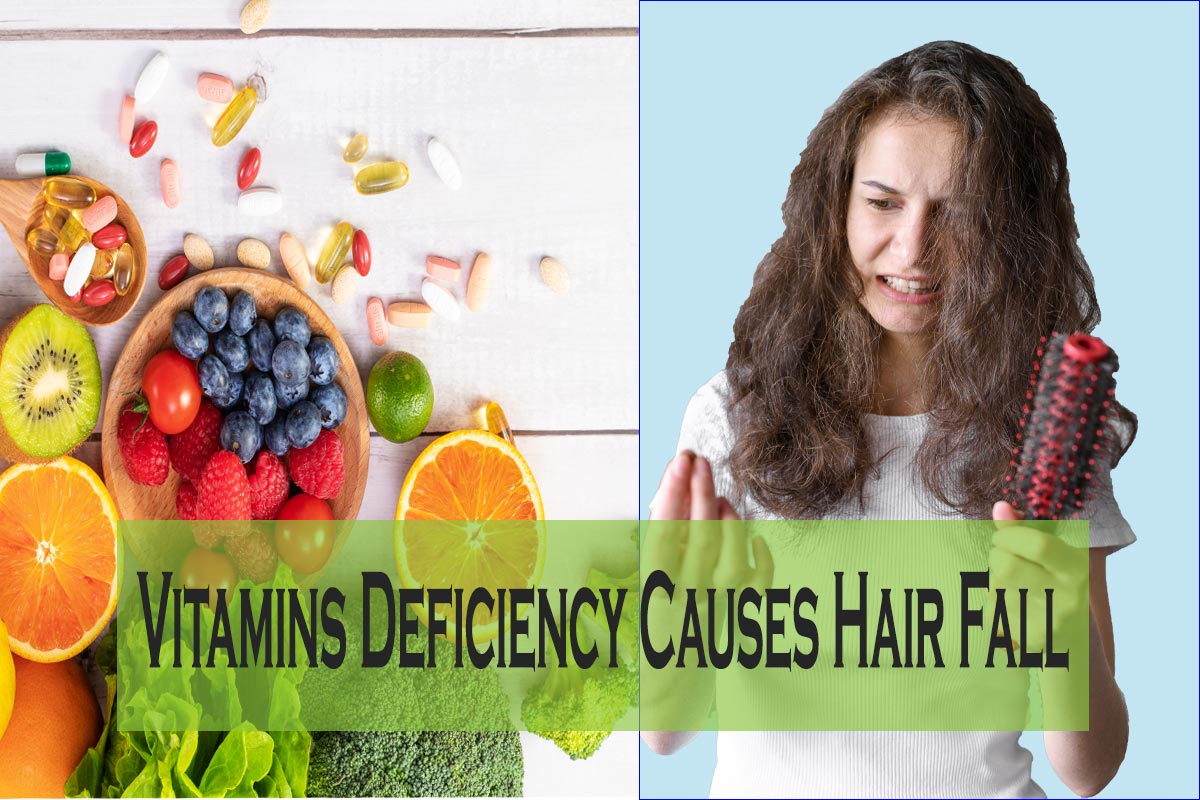Table of Contents
Introduction
Hair fall is a common concern for many individuals, and while there can be various reasons behind it, one significant factor is vitamin deficiency. In this article, we will delve into the world of vitamins and their role in maintaining healthy and luscious locks.
Understanding Vitamins Deficiency Causes Hair Fall
A lack of essential vitamins deficiency causes hair fall. When the body lacks vital nutrients like Vitamin A, B complex, C, D, iron, zinc, Omega-3 fatty acids, Vitamin E, and copper, it adversely affects the health of hair follicles. These nutrients play crucial roles in maintaining scalp health, promoting hair growth, and preventing issues like thinning and breakage. Recognizing and addressing these vitamin deficiencies through a balanced diet or supplements is vital for combating hair fall and ensuring a vibrant and healthy mane.
Vitamin A: The Hair Guardian
Vitamin A serves as the Hair Guardian by promoting a healthy scalp. This essential vitamin plays a pivotal role in the production of sebum, an oily substance that moisturizes the scalp and maintains the well-being of hair strands. Adequate levels of Vitamin A contribute to the nourishment and overall health of the hair, making it a crucial element in preventing dryness, brittleness, and potential hair loss. Including Vitamin A-rich foods in your diet supports the optimal functioning of hair follicles, ensuring a robust foundation for vibrant and luscious locks.
Vitamin B Complex: Energizing Your Locks
The Vitamin B complex, comprising Biotin (B7) and Niacin (B3), acts as a potent energy source for your hair. These essential vitamins play a pivotal role in converting nutrients into energy, providing the necessary fuel for vibrant and healthy locks. Biotin, specifically, contributes to the strength and resilience of hair strands, preventing breakage and promoting overall hair growth. Niacin enhances blood circulation to the scalp, ensuring optimal nutrient delivery to hair follicles. In essence, the Vitamin B complex is your hair’s natural energizer, fortifying it from within and contributing to a lustrous and robust mane.
Vitamin C: Collagen Boost for Hair
Vitamin C is a key player in promoting healthy hair by boosting collagen production. Collagen, a structural protein, contributes to the strength and resilience of hair. This essential vitamin ensures the formation of strong hair strands, making them less prone to breakage. Including Vitamin C-rich foods in your diet or considering supplements can positively impact hair health, supporting the overall vitality and appearance of your locks.
Vitamin D: The Sunshine Vitamin and Hair Loss
Vitamin D, often referred to as the “Sunshine Vitamin,” plays a crucial role in preventing hair loss. Exposure to sunlight stimulates the production of Vitamin D in the skin, contributing to overall hair health. This vitamin aids in the activation of hair follicles and supports the generation of new hair strands. A deficiency in Vitamin D has been linked to hair thinning and loss. Ensuring sufficient exposure to sunlight or incorporating Vitamin D-rich foods into your diet is essential for maintaining vibrant and resilient hair.
Iron Deficiency: Beyond Anemia
Iron deficiency can lead to anemia, but it also affects hair health. While iron deficiency is commonly associated with anemia, this section explores its impact on hair health specifically. Insufficient iron can hinder the proper functioning of hair cells, contributing to issues such as hair thinning and loss. Understanding this broader context is essential for comprehending the multifaceted role of iron in maintaining overall health and preventing specific concerns like hair fall.
Zinc: The Essential Element for Hair
Zinc is a vital element for hair health, playing a crucial role in the repair and growth of hair tissues. Its presence is essential for preventing hair shedding and maintaining overall hair strength. Incorporating zinc-rich foods into your diet is key to ensuring an adequate supply of this essential element, contributing to the well-being and resilience of your hair.
Omega-3 Fatty Acids: Nourishing from Within
Omega-3 Fatty Acids, found in sources like fatty fish and flaxseeds, provide internal nourishment for optimal health. These essential fatty acids contribute to the hydration of both hair and scalp, promoting resilience and reducing the risk of hair breakage and loss. Incorporating Omega-3s into your diet nurtures your hair from within, fostering a foundation for vibrant and healthy locks
Vitamin E: Antioxidant Armor for Your Hair
Vitamin E acts as antioxidant armor for your hair, shielding it from oxidative stress. This essential nutrient neutralizes free radicals that can damage hair cells and lead to dullness, breakage, or hair loss. By incorporating Vitamin E into your diet or hair care routine, you provide a protective layer, promoting healthier and more resilient hair. This antioxidant property of Vitamin E contributes to maintaining the overall well-being and vibrancy of your hair, making it a key player in the quest for luscious locks.
Copper: Balancing Act for Hair Growth
Copper is a crucial element in the delicate balance of promoting hair growth. This essential mineral plays a pivotal role in the production of melanin, the pigment responsible for hair color. By aiding in melanin synthesis, copper contributes to maintaining vibrant and healthy-looking hair. Ensuring an adequate intake of copper through diet or supplementation supports the overall balance needed for optimal hair growth and prevents issues such as premature graying and hair loss.
Biological Factors in Vitamin Absorption
Individual differences, such as genetics and health conditions, can impact how the body absorbs and utilizes vitamins. Understanding these factors is essential for addressing specific vitamin deficiencies.
Common Signs of Vitamin Deficiency-Induced Hair Fall
Recognizing the signs of vitamin deficiency is crucial. Symptoms like excessive hair shedding, thinning, and changes in hair texture may indicate the need for dietary adjustments or supplementation.
Dietary Recommendations for Healthy Hair
To promote healthy hair, include a variety of nutrient-rich foods in your diet. Incorporate fruits, vegetables, lean proteins, and whole grains to ensure a well-rounded intake of vitamins and minerals.
Seeking Professional Advice
If you’re experiencing persistent hair fall, consulting with a healthcare professional is essential. They can assess your individual needs and provide personalized recommendations, whether through dietary changes or supplements.
Conclusion
In conclusion, understanding the role of vitamins in preventing hair fall is crucial for maintaining a vibrant mane. A balanced diet, rich in essential vitamins and minerals, can go a long way in promoting healthy hair. However, it’s equally important to be aware of individual factors that may impact vitamin absorption.
Frequently Asked Questions(FAQs)
Can vitamin supplements alone prevent hair fall?
- While supplements can help, a balanced diet with a variety of nutrients is crucial for overall health.
- How long does it take to see results from dietary changes for hair health?
- Results vary, but with consistent dietary improvements, many people notice changes in a few months.
- Are there specific foods that target multiple vitamin deficiencies related to hair fall?
- Yes, foods like eggs, nuts, and leafy greens provide a mix of vitamins and minerals beneficial for hair health.
- Can excessive vitamin intake cause hair problems?
- Yes, excessive intake of certain vitamins can have adverse effects. It’s best to maintain a balanced approach.
- Is it necessary to consult a doctor for hair fall issues?
- If hair fall is persistent or severe, consulting a healthcare professional is recommended for a thorough assessment.



